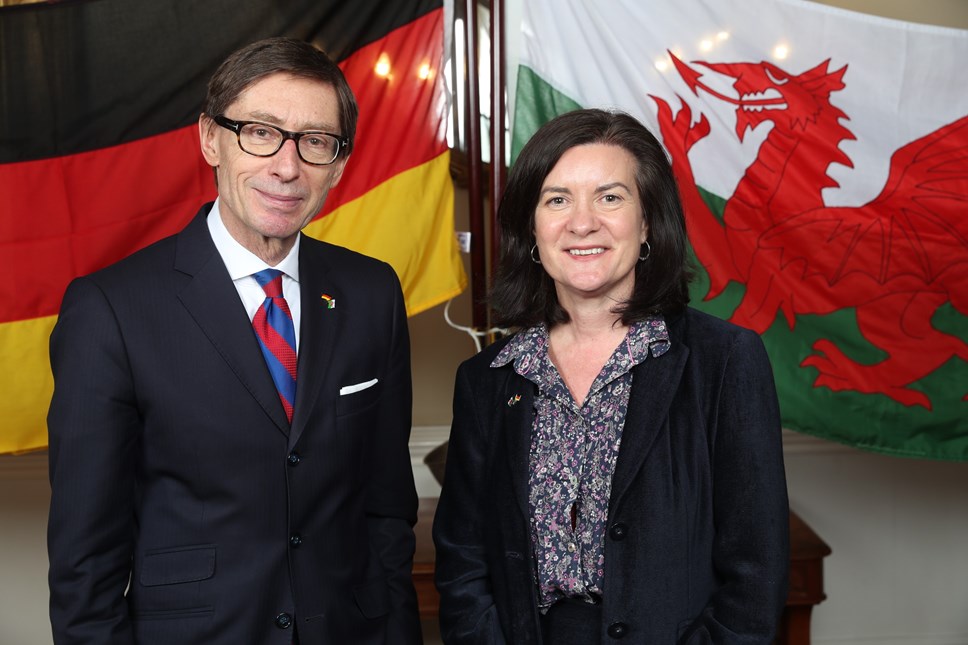
Wales looks forward to future relationship with its strongest trading partner as German Ambassador to UK visits key sites
Cymru yn edrych ymlaen at berthynas gref â’i phartner masnachol pwysicaf wrth i Lysgennad yr Almaen i’r DU ymweld â lleoliadau allweddol
Wales will do everything it can to continue its strong relationship with Germany – with trade links worth more than £3bn – as the next phase of negotiations with the EU continue.
That was the message from Eluned Morgan, the Minister for International Relations and Welsh Language, during a visit to Wales by Dr Peter Wittig, Germany’s Ambassador to the UK.
Dr Wittig met the Minister and First Minister Mark in Cardiff Bay, toured Cardiff University and also attended trade talks with Welsh Government representatives - followed by a reception for the German diaspora in Wales at Cardiff Castle.
The following day, the Ambassador visited German businesses based in North Wales, including Innogy in Mostyn, and the Airbus factory at Broughton.
Germany is one of Wales’ strongest trading partners.
2018 saw just over 18 per cent of all Welsh goods exported outside the UK going to Germany, with a total value of more than £3billion.
Germany is also a strong contributor to the tourism industry in Wales. After Ireland, Germany supplies the joint second-greatest number of visitors to Wales – an annual total of 87,000 visitors, according to recent figures.
This accounts for eight per cent of all international visits, and about seven per cent of total tourism spend.
Eluned Morgan, the Minister for International Relations and Welsh Language, said: “I was very pleased to meet Dr Wittig, and that we were able to discuss the ongoing and future relationship between Germany and Wales.
“Outside of the UK, Germany is our strongest trade partner, and as such talks such as these are all-important as we continue to look at ways to mutually enhance those links between us.”
The Minister added: “As the UK leaves the EU, our position is that Wales remains open to business with its European partners.
“We want to do everything we can to maintain the strong economic, cultural and trade links we have already built with a number of partner nations in the EU.
“As we recently set out in our International Strategy, we are working hard to ensure that we don’t lose any of those vital connections built up with European partners, such as Germany.”
The Minister added: “We have an incredibly strong base of German businesses working in Wales and employing Welsh workers, and I was very pleased to see that Dr Wittig had the opportunity to see the work being carried out by Innogy at its Flintshire base in the Port of Mostyn, through its work on the Gwynt y Môr offshore wind farm project.”
With an installed capacity of 576 megawatts, Gwynt y Môr is among the largest commercial offshore wind farms worldwide.
A total of 160 wind turbines produce enough electricity to supply approximately 400,000 households annually with renewable energy
Dr Wittig said: “I would like to thank the Welsh Government very much for this kind invitation.
“Wales and Germany already boast deep ties in many areas – business, culture, trade and people – ties we can trust and ties we can build upon.
“This should encourage us to overcome the uncertainty of the past three years – we can be bold in our ambitions and build a lasting future relationship.
“Germany is the most significant export destination for Wales – with one fifth of all Welsh exports going to Germany, while German exports to Wales amounted to 3.2 billion GBP in 2018.
“I can see more opportunities in many sectors – including in renewable energies, even closer academic ties, research on future industries and joint infrastructure projects.”
Notes to editors
5 things you may not have known about Wales’s links with Germany
1 - One of Wales’s biggest trading partners
2018 saw just over 18 per cent of all Welsh goods exported outside the UK going to Germany, with a total value of more than £3billion. By product sector, the most significant categories were ‘Machinery and transport equipment’, ‘Minerals, fuels, lubricants etc.’, and ‘Manufactured goods’.
2 - University links
After China, Germany sends more students to Welsh universities than any nation outside the UK. In the 2018/19 academic year, there were an estimated 680 German students enrolled on their first year at Wales’s eight universities.
3 - Twin towns
A number of Welsh towns and cities have twin towns or municipalities in Germany - Stuttgart is Cardiff’s oldest twin city; while Aberystwyth is twinned with Kronberg im Taunus; Swansea with Mannheim; Newport with Heidenheim and Wrexham with the district of Märkischer Kreis.
4 - Wales is big draw to German visitors
Germany is a big contributor to the Tourism industry in Wales. After Ireland, Germany supplies the joint second-greatest number of visitors to Wales – an annual total of 87,000 German visitors, according to recent figures. This accounts for eight per cent of all international visits, and about seven per cent of total tourism spend.
5 - One of Wales’ best-known exports was set up by homesick German immigrants
Wrexham Lager, which was founded in 1881, was set up by German immigrants Ivan Levinstein and Otto Isler in a bid to recreate their local lager – they chose the area specifically for the brewing quality of the underground water.
Captions
1 - Dr Peter Wittig, Germany's Ambassador to the UK, with Eluned Morgan, the Minister for International Relations and Welsh Language.
2 + 3 - The Ambassador visits Innogy's centre, in the Port of Mostyn in Flintshire.
